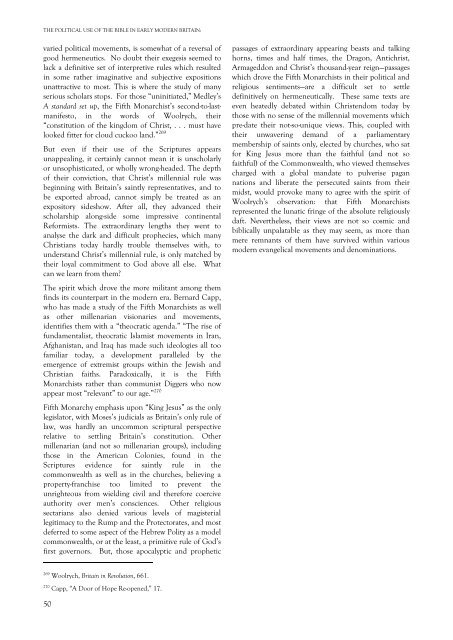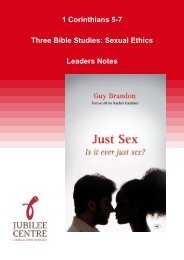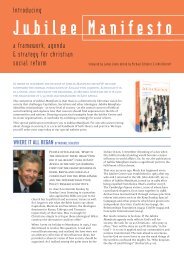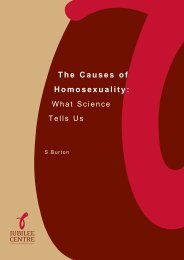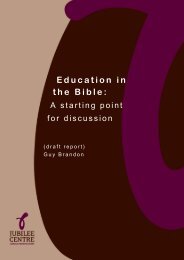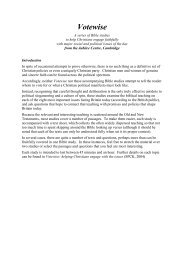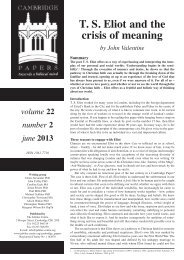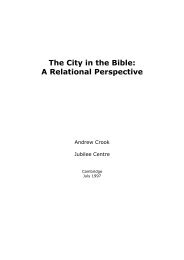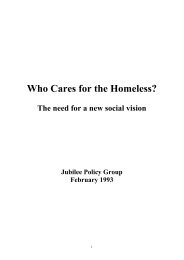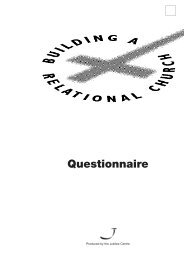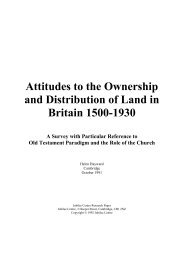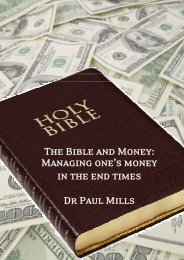Report Template - Jubilee Centre
Report Template - Jubilee Centre
Report Template - Jubilee Centre
You also want an ePaper? Increase the reach of your titles
YUMPU automatically turns print PDFs into web optimized ePapers that Google loves.
THE POLITICAL USE OF THE BIBLE IN EARLY MODERN BRITAIN:<br />
varied political movements, is somewhat of a reversal of<br />
good hermeneutics. No doubt their exegesis seemed to<br />
lack a definitive set of interpretive rules which resulted<br />
in some rather imaginative and subjective expositions<br />
unattractive to most. This is where the study of many<br />
serious scholars stops. For those “uninitiated,” Medley’s<br />
A standard set up, the Fifth Monarchist’s second-to-lastmanifesto,<br />
in the words of Woolrych, their<br />
“constitution of the kingdom of Christ, . . . must have<br />
looked fitter for cloud cuckoo land.” 269<br />
But even if their use of the Scriptures appears<br />
unappealing, it certainly cannot mean it is unscholarly<br />
or unsophisticated, or wholly wrong-headed. The depth<br />
of their conviction, that Christ’s millennial rule was<br />
beginning with Britain’s saintly representatives, and to<br />
be exported abroad, cannot simply be treated as an<br />
expository sideshow. After all, they advanced their<br />
scholarship along-side some impressive continental<br />
Reformists. The extraordinary lengths they went to<br />
analyse the dark and difficult prophecies, which many<br />
Christians today hardly trouble themselves with, to<br />
understand Christ’s millennial rule, is only matched by<br />
their loyal commitment to God above all else. What<br />
can we learn from them?<br />
The spirit which drove the more militant among them<br />
finds its counterpart in the modern era. Bernard Capp,<br />
who has made a study of the Fifth Monarchists as well<br />
as other millenarian visionaries and movements,<br />
identifies them with a “theocratic agenda.” “The rise of<br />
fundamentalist, theocratic Islamist movements in Iran,<br />
Afghanistan, and Iraq has made such ideologies all too<br />
familiar today, a development paralleled by the<br />
emergence of extremist groups within the Jewish and<br />
Christian faiths. Paradoxically, it is the Fifth<br />
Monarchists rather than communist Diggers who now<br />
appear most “relevant” to our age.” 270<br />
Fifth Monarchy emphasis upon “King Jesus” as the only<br />
legislator, with Moses’s judicials as Britain’s only rule of<br />
law, was hardly an uncommon scriptural perspective<br />
relative to settling Britain’s constitution. Other<br />
millenarian (and not so millenarian groups), including<br />
those in the American Colonies, found in the<br />
Scriptures evidence for saintly rule in the<br />
commonwealth as well as in the churches, believing a<br />
property-franchise too limited to prevent the<br />
unrighteous from wielding civil and therefore coercive<br />
authority over men’s consciences. Other religious<br />
sectarians also denied various levels of magisterial<br />
legitimacy to the Rump and the Protectorates, and most<br />
deferred to some aspect of the Hebrew Polity as a model<br />
commonwealth, or at the least, a primitive rule of God’s<br />
first governors. But, those apocalyptic and prophetic<br />
passages of extraordinary appearing beasts and talking<br />
horns, times and half times, the Dragon, Antichrist,<br />
Armageddon and Christ’s thousand-year reign—passages<br />
which drove the Fifth Monarchists in their political and<br />
religious sentiments—are a difficult set to settle<br />
definitively on hermeneutically. These same texts are<br />
even heatedly debated within Christendom today by<br />
those with no sense of the millennial movements which<br />
pre-date their not-so-unique views. This, coupled with<br />
their unwavering demand of a parliamentary<br />
membership of saints only, elected by churches, who sat<br />
for King Jesus more than the faithful (and not so<br />
faithful) of the Commonwealth, who viewed themselves<br />
charged with a global mandate to pulverise pagan<br />
nations and liberate the persecuted saints from their<br />
midst, would provoke many to agree with the spirit of<br />
Woolrych’s observation: that Fifth Monarchists<br />
represented the lunatic fringe of the absolute religiously<br />
daft. Nevertheless, their views are not so cosmic and<br />
biblically unpalatable as they may seem, as more than<br />
mere remnants of them have survived within various<br />
modern evangelical movements and denominations.<br />
269<br />
Woolrych, Britain in Revolution, 661.<br />
270<br />
Capp, “A Door of Hope Re-opened,” 17.<br />
50


